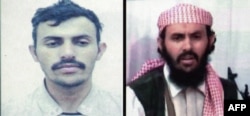The U.S. military said an airstrike earlier this month in southeastern Afghanistan killed a top al-Qaida commander.
"We have confirmed that Abu Khalil al-Sudani, a high-ranking al-Qaida operational commander, was killed by a U.S. airstrike in Bermal district, Paktika province, Afghanistan, on July 11, 2015," Pentagon press secretary Peter Cook said in a statement Friday.
The statement described al-Sudani as the head of the Sunni militant group's "suicide and explosive operations," adding that he was directly linked to plotting attacks on U.S., Afghan and Pakistani forces.
Linked to leader
Col. Pat Ryder, spokesman for U.S. Central Command, told reporters at the Pentagon on Friday that the death disrupted al-Qaida’s ability to conduct attacks, “at least temporarily.”
“The death of al-Sudani denies al-Qaida a well-connected, proven operational planner and leader,” Ryder said.
Cook also said that al-Sudani maintained close ties with al-Qaida leader Ayman al-Zawahiri.
"Al-Sudani was one of three known violent extremists killed in the strike," Cook's statement said. "We will continue to counter violent extremism in the region and the world."
The names of the two others killed in the strike were not given.
"The death of al-Sudani will further degrade al-Qaida operations across the globe," Defense Secretary Ash Carter said in a statement. "We will continue to counter violent extremism in the region and the world."
Al-Qaida officials targeted
U.S. airstrikes have killed several high-ranking al-Qaida officials in recent months, including Nasir al-Wuhayshi, the group's deputy chief and the leader of its potent Yemen branch, who was killed by a drone strike last month in Yemen.
Earlier this week, the Pentagon announced at a longtime al-Qaida operative was killed in a U.S. airstrike in early July while traveling near Sarmada, Syria.
Muhsin al-Fadhli was the leader of a network of al-Qaida operatives called the Khorasan Group, "who are plotting external attacks against the United States and our allies," Navy Captain Jeff Davis, a Pentagon spokesman, said in a statement Tuesday.
Davis added that al-Fadhli "was a senior al-Qaida facilitator who was among the few trusted al-Qaida leaders that received advanced notification of the Sept. 11, 2001, attacks."





